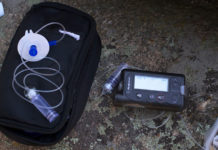
Pancreas cells synthesizing insulin can be grown from skin cells.
The February issue of the Stem Cell journal published an article about a new breakthrough in regenerative medicine. Scientists were able to grow the beta cells of the pancreas responsible for insulin synthesis.
The research consisted of two stages. In the first stage, biologists received stem cells from skin fibroblasts using the 2012 Nobel Prize-winning technology for reprogramming cells. Next, they managed to synthesize insulin in the cells obtained.
After these manipulations, new cells were transplanted to experimental mice suffering from diabetes. Researchers have demonstrated that the level of sugar in the blood of the infected animals decreased to normal levels. Cells took root in the pancreas, and the animals could be considered almost healthy.
Replacing the beta cells of the pancreas with those able to produce enough of their own insulin is a welcome solution that would allow giving up constant injections. Based on the successful experience with transplantation of the modified cells in rodents, scientists are close to a complete cure of the disease in humans.






